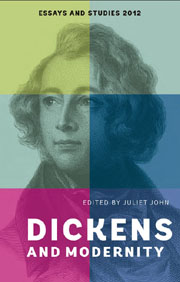Book contents
- Frontmatter
- Contents
- LIST OF ILLUSTRATIONS
- ACKNOWLEDGEMENTS
- NOTES ON THE CONTRIBUTORS
- INTRODUCTION
- 1 THE DICKENS TAPE: AFFECT AND SOUND REPRODUCTION IN THE CHIMES
- 2 DICKENS, SEXUALITY AND THE BODY; OR, CLOCK LOVING: MASTER HUMPHREY'S QUEER OBJECTS OF DESIRE
- 3 TEXTS, PARATEXTS AND ‘E-TEXTS’: THE POETICS OF COMMUNICATION IN DICKENS'S JOURNALISM
- 4 CORPUS STYLISTICS – DICKENS, TEXT-DRIVENNESS AND THE FICTIONAL WORLD
- 5 THINGS, WORDS AND THE MEANINGS OF ART
- 6 DICKENS AND THE CIRCUS OF MODERNITY
- 7 THE OLIVER! PHENOMENON; OR, ‘PLEASE, SIR, WE WANT MORE AND MORE!’
- 8 ‘WOW! SHE'S A LESBIAN. GOT TO BE!’: RE-READING/RE-VIEWING DICKENS AND NEO-VICTORIANISM ON THE BBC
- 9 OUT OF PLACE: DAVID COPPERFIELD'S IRRESOLVABLE GEOGRAPHIES
- 10 AFTERWORD: THE 2012 BICENTENARY
- Index
10 - AFTERWORD: THE 2012 BICENTENARY
Published online by Cambridge University Press: 05 February 2013
- Frontmatter
- Contents
- LIST OF ILLUSTRATIONS
- ACKNOWLEDGEMENTS
- NOTES ON THE CONTRIBUTORS
- INTRODUCTION
- 1 THE DICKENS TAPE: AFFECT AND SOUND REPRODUCTION IN THE CHIMES
- 2 DICKENS, SEXUALITY AND THE BODY; OR, CLOCK LOVING: MASTER HUMPHREY'S QUEER OBJECTS OF DESIRE
- 3 TEXTS, PARATEXTS AND ‘E-TEXTS’: THE POETICS OF COMMUNICATION IN DICKENS'S JOURNALISM
- 4 CORPUS STYLISTICS – DICKENS, TEXT-DRIVENNESS AND THE FICTIONAL WORLD
- 5 THINGS, WORDS AND THE MEANINGS OF ART
- 6 DICKENS AND THE CIRCUS OF MODERNITY
- 7 THE OLIVER! PHENOMENON; OR, ‘PLEASE, SIR, WE WANT MORE AND MORE!’
- 8 ‘WOW! SHE'S A LESBIAN. GOT TO BE!’: RE-READING/RE-VIEWING DICKENS AND NEO-VICTORIANISM ON THE BBC
- 9 OUT OF PLACE: DAVID COPPERFIELD'S IRRESOLVABLE GEOGRAPHIES
- 10 AFTERWORD: THE 2012 BICENTENARY
- Index
Summary
‘I am sure that a man, a hundred years hence, should [he] sit down to write the history of our time, would do wrong to put that great contemporary history of Pickwick aside as a frivolous work.’ (W. M. Thackeray, The Paris Sketch Book, 1840)
‘It seems to be a national benefit, and to every man or woman who reads it a personal kindness.’ (W. M. Thackeray [on A Christmas Carol], ‘A Box of Novels’, Fraser's Magazine, February 1844)
‘There is no writing against this. One hasn't an atom of chance.’ (W. M. Thackeray on Dombey and Son, quoted in George Hodder, Memories of My Time (London, 1870), 277)
In the context of the bicentennial celebrations for the author of The Pickwick Papers and A Christmas Carol, William Makepeace Thackeray's immediate observations on the longevity and impact of Charles Dickens's stories take on a prophetic quality: Dickens's works are far from being considered frivolous, A Christmas Carol has proved to be an international benefit (not least in a commercial sense), and it would seem that no other Victorian writer was able to take on the challenge to ‘write against’ Boz.
Writing this essay in 2011 – the bicentenary year of Thackeray's birth – I should be astonished at the lack of public interest in the author of Vanity Fair, who, after all, is considered by some second only to Dickens among the great Victorian writers.
- Type
- Chapter
- Information
- Dickens and Modernity , pp. 209 - 222Publisher: Boydell & BrewerPrint publication year: 2012



